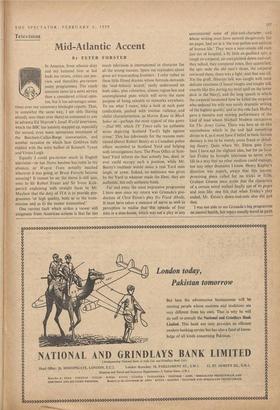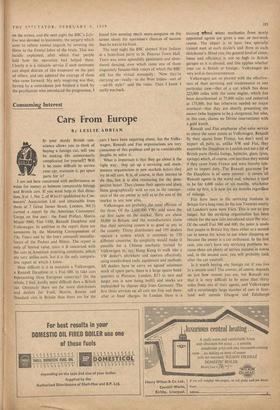Television
Mid-Atlantic Accent
By PETER FORSTER
IN America, from whence duty and my battered liver at last bade me return, critics can pre- view and therefore pre-review many programmes. The result amounts more to a news service than a considered critical opin- ion, but it has advantages some- times over our customary hindsight reports. Thus, in somewhat the same way, I am able (having already seen them over there) to commend to you in advance Ed Murrow's Sinai! World interviews, which the BBC has astutely snapped up, especially the second, even more uproarious instalment of the Beecham-Callas-Borge conversation, and another occasion on which Sam Goldwyn falls riddled with the witty bullets of Kenneth Tynan and Vivien Leigh.
Equally I could pre-review much in English television—or has Dotto become less rotto in my absence, or Wagon Train actually reached wherever it was going, or Bruce Forsyth become amusing? It cannot be so; the status is still quo, even to Sir Robert Fraser and Sir Ivone Kirk- patrick explaining with straight faces to Mr. Mayhew that the duty of ITA is to provide pro- grammes 'of high quality, both as to the trans- mission and as to the matter transmitted.'
One current fault which strikes a viewer still astigmatic from American screens is that far too much television is international in character for all the wrong reasons. Spare me rejoinders about great art transcending frontiers : I refer rather to these little filmed dramas whose formula demands the 'mid-Atlantic accent,' easily understood on both sides, plus colourless, almost region-less and uncomplicated plots which will serve the same purpose of being saleable to networks anywhere. To see what I mean, take a look at such poor confections, packed with routine violence, and cliche characterisation, as Martin Kane or Mark Saber or—perhaps the most typical of this genre —Dial 999, which TV Times calls 'an authentic series depicting Scotland Yard's fight against crime.' This has (obviously for the reasons men- tioned above) Robert Beatty as a Canadian police officer seconded to Scotland Yard and helping with investigations here. The Press Office at Scot- land Yard inform the that nobody has, doei, or ever could occupy such a position, while Mr. Beatty's methods would make a real Yard man laugh, or yawn. Indeed, no assistance was given by the Yard to whoever made the films; they are authentic, but only authentic bunk.
Far and away the most impressive prokramme I have seen since my return was Granada's pro- duction of Clive Exton's play No Fixed Abode. It must have taken a measure of nerve as well as perception to realise that this episode of four men in a doss-house, which was not a play in any conventional sense of plot-and-character, and whose writing must have seemed dangerously flat on paper, had yet in it 'the true pathos and sublime of human life.' They were a near-simple old man just out of hospital, a fly little ex-gaolbird spiv, a rough ex-corporal, an unexplained down-and-out; they talked, they compared notes, they quarrelled; the spiv stole the old man's shoes, the corporal retrieved them, there was a fight; and that was all. Yet the gruff, illiterate talk was caught with most delicate exactness (I heard roughs and toughs talk exactly like this during my brief spell on the lower deck in the Navy), and the long speech in which the corporal recounted how he killed the sergeant who seduced his wife was surely dramatic writing of the highest quality; and in this role Jack Hedley gave a massive and moving performance of the kind of man whom Michael Medwin caricatures for The Army Game. There was here an ox-like uncouthness which in the end had something divine in it, as it must have if belief in basic human decency is not to be merely pious fraud or delud- ing theory. Quite where Mr. Exton goes from here I have not the slightest idea, but for an hour 'last Friday he brought television to terms with life in a way that no other medium could manage, nor any other dramatist I know. Henry Kaplan's direction was superb, aware that this uncom- promising piece called for no tricks or frills. Graham Greene once wrote that the characters of a. certain novel walked finally out of its pages and into life; one felt that when Friday's play ended, Mr. Exton's down-and-outs also did just that.
I was not able to see Granada's big programme on mental health, but topics usually travel in pairS on the screen, and the next night the BBC's Life- line was devoted to leucotomy, the surgery which aims to relieve mental anguish by severing the fibres to the frontal lobes of the brain. This was lucidly explained, after which four people told how the operation had helped them. Clearly it is a valuable service if such testimony can dispel distrust of like treatment on the part of others, and one admired the courage of those who came forward. My only misgiving was that, having by a coincidence just finished a book by the psychiatrist who introduced the programme, I found him seeming much more_sanguine on the screen about the operation's chances of success than he was in his book.
The next night the BBC showed West Indians at a bean-feast party in St. Pancras Town Hall. There was some splendidly passionate and aban- doned dancing, over which came one of those exquisitely fatuous-blah voices of which the BBC still has the virtual monopoly : 'Now they're carrying on—really—in the West Indies—sort of —ad-lib style!' said the voice. Then I knew I really was back.







































 Previous page
Previous page